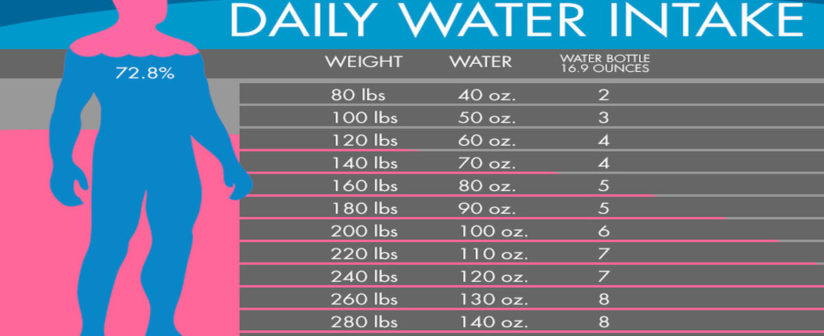The body is about 60% water, give or take. We’re constantly losing water from our bodies, primarily via urine and sweat. How much water should you drink each day? It’s a simple question with no easy answers. Studies have produced varying recommendations over the years, but in truth, your water needs depend on many factors, including your health, how active you are and where you live.
Although no single formula fits everyone, knowing more about your body’s need for fluids will help you estimate how much water to drink each day. There are many different opinions on how much water we should be drinking every day.
The health authorities commonly recommend eight 8-ounce glasses, which equals about 2 litters, or half a gallon. This is called the 8×8 rule and is very easy to remember. However, there are other health gurus who think we’re always on the brink of dehydration and that we need to sip on water constantly throughout the day… even when we’re not thirsty.
As with most things, this depends on the individual and there are many factors (both internal and external) that ultimately affect our need for water.
Factors that influence water needs
Exercise. If you exercise or engage in any activity that makes you sweat, you need to drink extra water to compensate for the fluid loss. An extra 1.5 to 2.5 cups (400 to 600 milliliters) of water should suffice for short bouts of exercise, but intense exercise lasting more than an hour (for example, running a marathon) requires more fluid intake. How much additional fluid you need depends on how much you sweat during exercise, and the duration and type of exercise.
Intense exercise. During long bouts of intense exercise, it’s best to use a sports drink that contains sodium, as this will help replace sodium lost in sweat and reduce the chances of developing hyponatremia, which can be life-threatening. Also, continue to replace fluids after you’re finished exercising.
Environment. Hot or humid weather can make you sweat and requires additional intake of fluid. Heated indoor air also can cause your skin to lose moisture during wintertime. Further, altitudes greater than 8,200 feet (2,500 meters) may trigger increased urination and more rapid breathing, which use up more of your fluid reserves.
Illnesses or health conditions. When you have fever, vomiting or diarrhea, your body loses additional fluids. In these cases, you should drink more water. In some cases, your doctor may recommend oral rehydration solutions, such as Gatorade, Powerade or CeraLyte. You may also need increased fluid intake if you develop certain conditions, including bladder infections or urinary tract stones. On the other hand, some conditions, such as heart failure and some types of kidney, liver and adrenal diseases, may impair excretion of water and even require that you limit your fluid intake.
Pregnancy or breast-feeding. Women who are pregnant or breast-feeding need additional fluids to stay hydrated. Large amounts of fluid are used especially when nursing. The Institute of Medicine recommends that pregnant women drink about 10 cups (2.3 liters) of fluids daily and women who breast-feed consume about 13 cups (3.1 liters ) of fluids a day.
How can you tell if you are drinking enough water?
The easiest way to know if you’re drinking enough fluid is to look at the color of your urine. If you’re drinking enough water, your urine will be clear or pale yellow. A darker yellow means you aren’t drinking enough water.People who drink enough water also usually have soft bowel movements. Hard bowel movements or constipation can be signs that you aren’t getting enough water.
What are some easy ways to get more water during the day?
- Drink a glass of water when you get up in the morning, before you have coffee or tea.
- Keep a cup or water bottle by your desk at work. Take several sips of water each hour. If you don’t have a desk job, carry a container of water with you, and take sips throughout the day.
- Take a sip whenever you pass a drinking fountain.
- If you get tired of drinking plain water, add a packet of sugarless flavoring to your water. Or put a slice of lemon or lime in plain or sparkling water.
Your water guide
- Drink around two to four glasses of water (roughly amounting to 800 ml) after waking up
- If you work in an airconditioned environment and follow a sedentary lifestyle, do not drink more than 2 to 2.5 litres of water per day
- For moderate workers, for instance salespersons, it is important to drink around three litres of water
- During summers, keep yourself hydrated by drinking water at regular intervals. If you don’t suffer from diabetes or blood pressure, having electrolyte or glucose water is also advisable
If you have any health problems, always talk to your doctor before increasing the amount of water you drink. You may need to limit your fluids if you have certain health concerns, such as kidney problems or heart failure.


